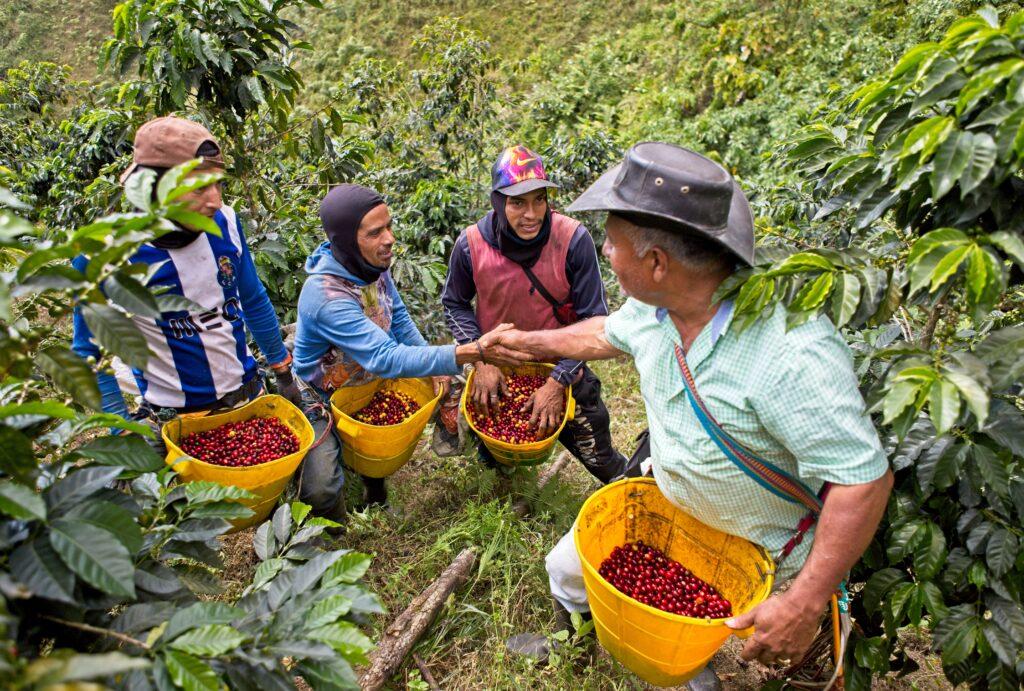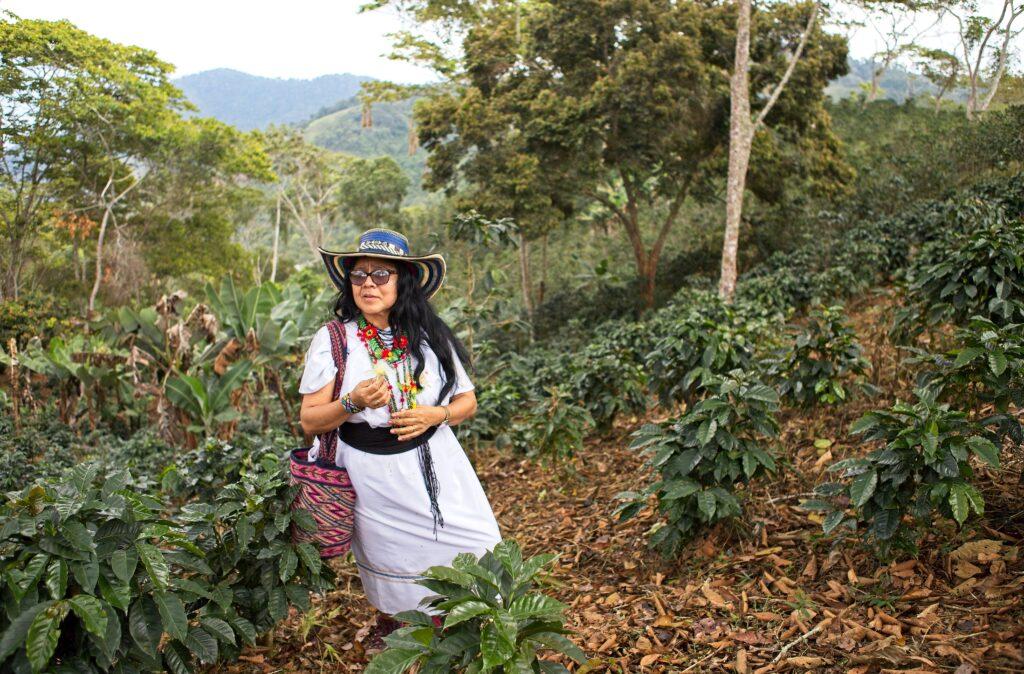9 things you probably didn’t know about fair trade coffee (and were afraid to ask!)
Curious about fair trade coffee? Here are some facts that may surprise you and may just teach you something new about Fairtrade certified coffee.
“Fair trade” doesn’t always mean fairer prices
Wait, what?
You heard that right. While “fair trade” is supposed to be about developing sustainable trade relationships, the price that coffee farmers receive isn’t always guaranteed just because a brand claims it is fair trade.
The foundation of Fairtrade certification is about getting a fairer deal for farmers. That is why the Fairtrade system sets a minimum price for coffee (called the Fairtrade Minimum Price), which is a price that aims to cover the cost of sustainable production and that must be paid for a product to become certified.
Because coffee is traded on a stock exchange called the C Market, the price of coffee is volatile and on average changes every three minutes. The Fairtrade Minimum Price means that even if market prices drop, coffee farmers can rely on earning that price for their coffee no matter what. What happens if the market prices are higher? Then the coffee farmer receives the higher market price. For context, C Market prices have been below the Minimum Price 52% of the time since 2011!
Coffee farmers also receive a Fairtrade Premium. This is an additional sum of money on top of the selling price that farmer co-operatives democratically choose how to invest (for example in improving production or community projects like schools, day cares and medical facilities).
So, when you see a bag of coffee with the Fairtrade Mark on it, you know that the farmer behind those beans was guaranteed a minimum price and that they voted on how to invest the Fairtrade Premium.
Not just anyone can slap a Fairtrade logo on their coffee and call it ethical
There is an increasing number of fair trade coffee brands to choose from out there, in part because there is more demand for fair trade coffee. But what actually determines whether a product was fairly traded?
Fairtrade (one word) is a registered certification label, and any coffee that wants to use the Fairtrade Mark must first meet the Fairtrade Standards (a set of social, economic and environmental rules that need to be met in order to get certified). These Standards are designed to support the sustainable development of small producer organizations and agricultural workers and are founded in principles of respect for people and planet.
You can be 100% confident that Fairtrade certified coffee is exactly what we say it is
Canadians really care about ethical coffee consumption and want to know that their coffee is ACTUALLY doing some good.
While some fair trade coffee brands make big claims about being fair, how can you be sure that those claims are legit?
All products with the Fairtrade Mark have been independently verified by FLOCERT, a third-party certifier that conducts regular audits to make sure the Fairtrade Standards are being met. FLOCERT can and do suspend or, in some cases, even decertify Fairtrade producer organisations if their audits show that Fairtrade Standards are not being met.
That means when we say that buying Fairtrade coffee is supporting farmers to get a better deal, you don’t just have to take our word for it.
You can read more about the impact of Fairtrade coffee here.

Fairtrade centres coffee farmers’ voices
Developing more sustainable systems of trade is a global effort that involves brands, shoppers, governments, activists, and, of course, farmers. But too often, discussions and decision-making on how to make trade more sustainable leave out the voices of those most disadvantaged by those systems of trade.
Fairtrade advocates for the voices of farmers and workers to be heard and centred as decisions are made about their future.
Fairtrade is 50% owned by farmers and workers, and farmers and workers are actively consulted when establishing new standards and policies for Fairtrade. This means any decisions made about how Fairtrade works inherently involves the voices of farmers.
Fairtrade certified coffee is NOT more expensive
Canadian coffee culture is a thing, and while the cost of your favourite brew can vary depending on a few factors, just because it is certified Fairtrade doesn’t always mean that it is more expensive than non-certified products.
A full range of Fairtrade coffees are available in Canada, and many are available as retail private label or less expensive mainstream brands.
What does that mean? Well you don’t need to break the bank to switch to a responsibly-sourced coffee brand, and you can do good while staying within budget.
Check out our shop local page for some of the Fairtrade coffee brands you can choose from.
Fairtrade proactively encourages coffee farmers to improve their products
Coffee farming challenges are many, including dealing with the effects of climate change and the rising cost of producing coffee. Working with coffee farmers so they can sell more of their coffee on Fairtrade terms is a big part of what we do.
As part of our system, farmers must invest 25% of the Fairtrade Premium back into initiatives that help improve quality and productivity, which are fundamental ways of increasing farmers’ incomes and helping them sell more on Fairtrade terms. Because the better the coffee, the more demand there will be for their beans.
Producer Networks are local associations that represent small-scale farmers and workers who are part of Fairtrade certified producer organizations. Producer Networks work with coffee farmers to provide training and supports to help them improve the quality of their crops.
Many Fairtrade coffee farmers have won awards for their coffees and take great pride in the quality of their coffee beans.

Fairtrade coffee helps protect the environment
Coffee farmers are at the frontline of climate change and often feel its effects through unpredictable weather patterns, pests, and crop failures. Sustainable trade must include protections for the environment and support for farmers addressing and mitigating the challenges of climate change.
Fairtrade certification is all about sustainable coffee production.
The Fairtrade Standards, which all Fairtrade certified coffee farmers must follow, encourage environmental protection by setting rules that prohibit the use of harmful chemicals, promote soil fertility and water conservation, prohibit deforestation, and protect biodiversity.
Fairtrade also provides free training and financial support to coffee farmers so they can produce more resilient crops and help them adapt, mitigate and become more resilient to the effects of climate change.
Fairtrade coffee promotes gender equality
How can you determine the social impact of fair trade coffee?
Well, coffee that is Fairtrade certified has met a set of social standards like the promotion of gender equality. The Fairtrade Standards include requirements like no discrimination based on gender or marital status, zero tolerance of abusive or exploitative behaviour, requirements to develop a gender policy, and programs to support disadvantaged and minority groups.
Producer Networks across many countries have also established women’s schools of leadership, enabling women to learn business, negotiation and finance skills. Many of the women go on to take on leadership and committee positions within their co-operatives and communities.
Fairtrade coffee stands against child labour
Fairtrade is committed to addressing the root causes of child labour and preventing the abuse and exploitation of children.
Poverty is the main cause of child labour, and the Fairtrade Minimum Price and Premium provide important financial security so farmers don’t need to fall back on their children to support them on the farm.
The Fairtrade Standards prohibit child labour, and through Fairtrade’s Producer Networks and our auditor FLOCERT, we identify high-risk areas and support producers to develop action plans and program to remediate child labour.